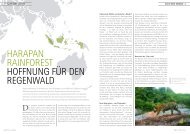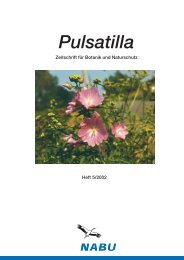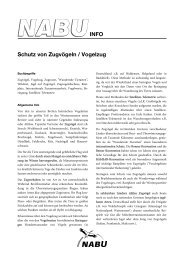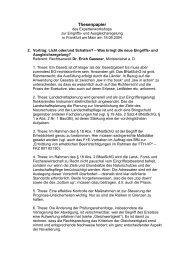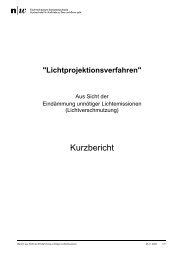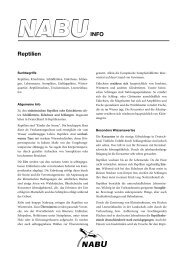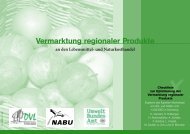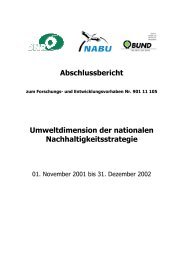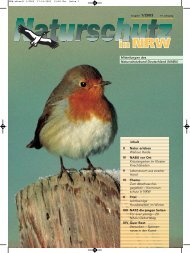Studie "The GMO-emperor has no clothes" (engl.) - Nabu
Studie "The GMO-emperor has no clothes" (engl.) - Nabu
Studie "The GMO-emperor has no clothes" (engl.) - Nabu
You also want an ePaper? Increase the reach of your titles
YUMPU automatically turns print PDFs into web optimized ePapers that Google loves.
VII.<br />
But as local adaptation is the inescapable requirement for the survival of species, so is the indispensable<br />
criterion for an enduring agriculture. Ultimately, the problem of agriculture – as such, <strong>no</strong>t as an industry –<br />
will be solved on farms, farm by farm, <strong>no</strong>t in laboratories or factories. And so we must regard every proposed<br />
industrial solution to an agricultural problem – including biotech<strong>no</strong>logy – as potentially a distraction from<br />
the real problem and an obstacle to the real solution.<br />
VIII.<br />
Finally, to do full justice to this issue, we must consider the likelihood that genetic engineering is <strong>no</strong>t<br />
just a science, a tech<strong>no</strong>logy, and a business but is also an intellectual fad and to some extent an eco<strong>no</strong>mic<br />
bubble. It is being sold, and therefore oversold, as the latest answer-to-everything: it will solve the problem<br />
of hunger; it will cure every disease; it will “engineer our emotions, to make us happy and content all<br />
the time” (even, presumably, when we are broke, friendless, and have been hit by a car): it will permit<br />
everybody’s ge<strong>no</strong>me to be “read” in a sort of new-age palmistry. It is swarmed about by speculators and by<br />
what Sharon Kardia of the University of Michigan called “snake oil salesmen”.<br />
IX.<br />
Biotech<strong>no</strong>logy also is extremely expensive in comparison to conventional plant breeding and is costly to<br />
farmers. Some biotech<strong>no</strong>logy companies are begging for money, while others are giving huge grants to<br />
university microbiology departments. <strong>The</strong> industry’s attitude toward farmers is hostile, as demonstrated<br />
by its lawsuits against them and its pursuit of the “terminator gene”. Its attitude toward consumers is<br />
aggressive and contemptuous, as demonstrated by its campaign against labelling.<br />
X.<br />
<strong>The</strong> biotech<strong>no</strong>logy industry is thus founded on questionable science, is ethically obscure, is eco<strong>no</strong>mically<br />
uncertain; it involves unconfronted dangers to the natural world and human health, and its eco<strong>no</strong>mic<br />
benefit to farmers or to food production <strong>has</strong> <strong>no</strong>t been demonstrated. It is the sort of gamble typically<br />
attractive to corporate investors and venture capitalists, who in fact have supported it lavishly. Any<br />
biotech<strong>no</strong>logy enterprise that fails to attract sufficient funds from those sources should be considered to<br />
have failed a critical test. Such an enterprise can<strong>no</strong>t responsibly be bailed out with public funds or with<br />
funds dedicated to the relief of distressed farmers. To do so would be, in effect, to levy a tax for the support<br />
of a private business. It would be a breach of trust.<br />
XI.<br />
Richard Strohman, of the University of California-Berkeley, <strong>has</strong> proposed that the problems of<br />
biotech<strong>no</strong>logy arise, <strong>no</strong>t because the science is new, but because it is old. He sees it is a development of<br />
a new outdated paradigm according to which scientists have undertaken to supply simple solutions to<br />
complex problems, without due regard to the complexity of the problems. <strong>The</strong> proper scientific response<br />
to this, he says, is to enlarge the context of the work.<br />
XII.<br />
If biotech<strong>no</strong>logy is <strong>no</strong>t a sufficient, or even an adequate, answer to agricultural problems, then what do<br />
we need? My own answer is that we need a science of agriculture that is authentically new – a science that<br />
freely and generously accepts the farm, the local ecosystem, and the local community as contexts, and then<br />
devotes itself to the relationship between farming and its ecological and cultural supports.<br />
* From Citizenship Papers, 2002<br />
Wendell Berry is a conservationist, farmer, essayist, <strong>no</strong>velist, professor of English, and poet. <strong>The</strong> New York Times<br />
<strong>has</strong> called Berry the “prophet of rural America.” Wendell Berry is the author of more than 30 books of essays,<br />
poetry and <strong>no</strong>vels. He <strong>has</strong> worked a farm in Henry County, Kentucky since 1965.<br />
44



